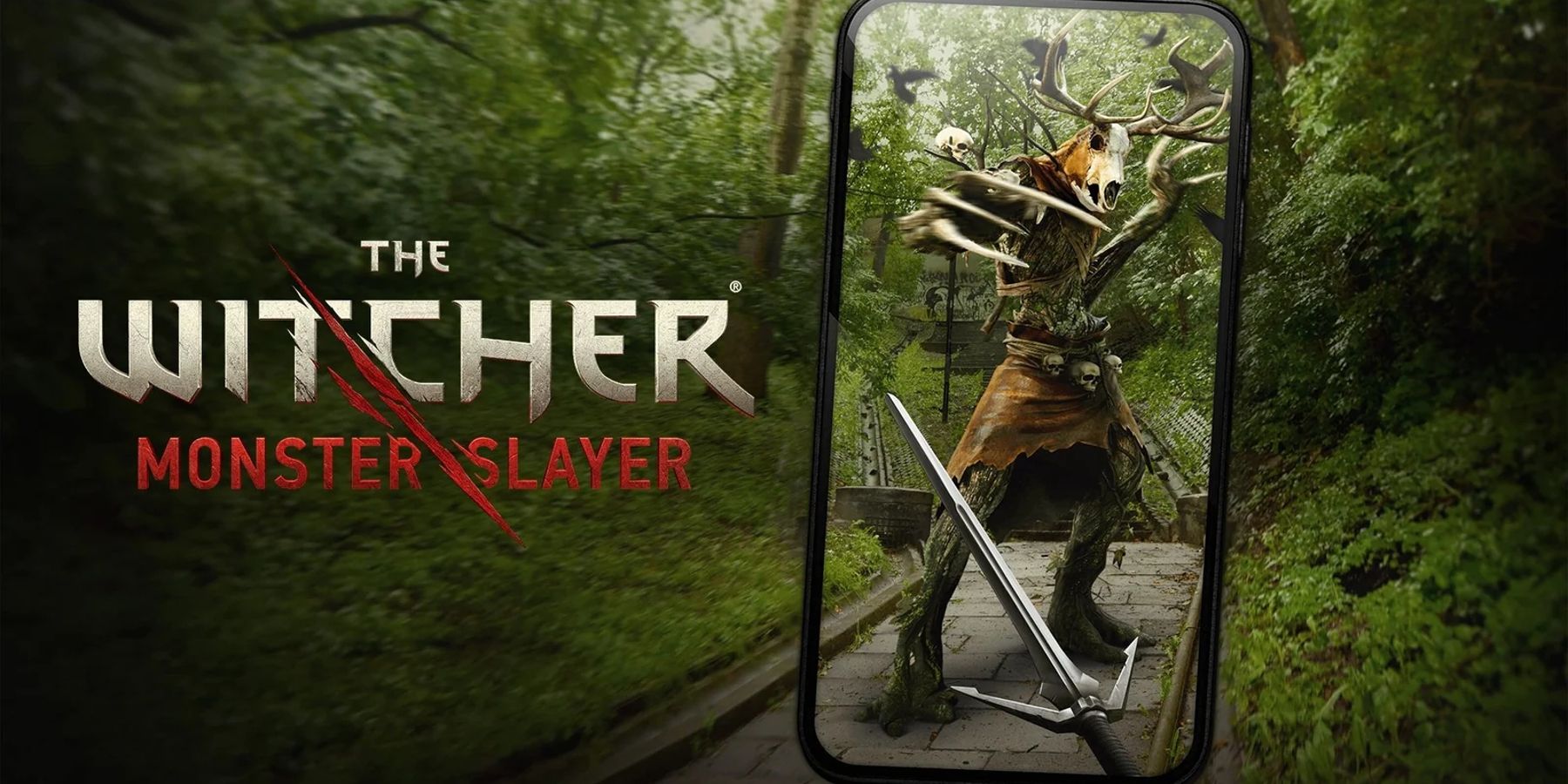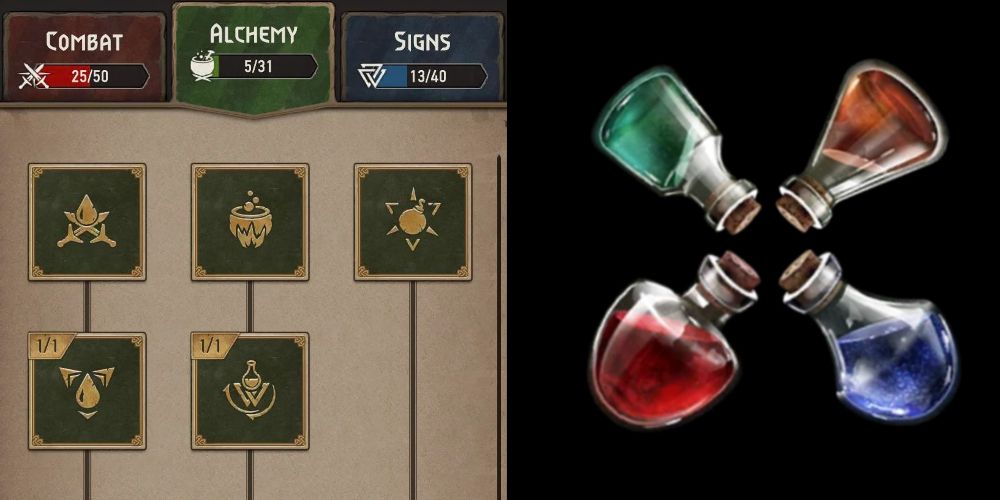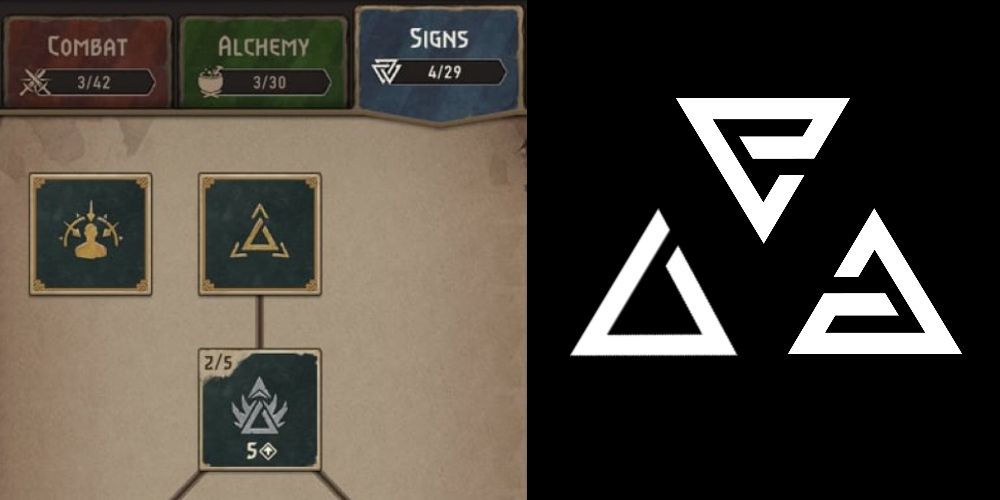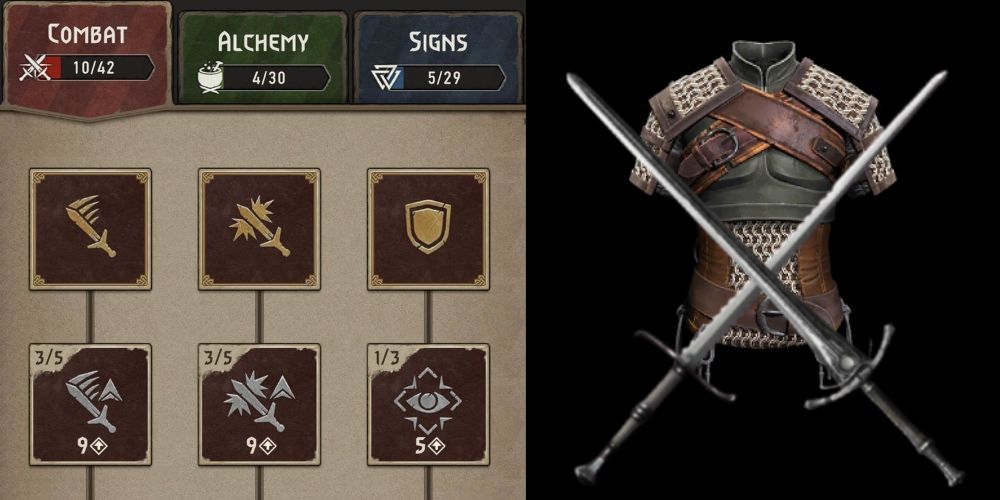The Witcher: Monster Slayer was released late in July to a mostly great reception, with there being a lot of praise about the fledgling game. The Witcher: Monster Slayer is a GPS-based mobile game that puts emphasis on quests, crafting, and combat – and it feels surprisingly complex, for a mobile title.
As players level up, they will receive skill points that can be allocated into one of three Skill Trees: Combat, Alchemy, and Signs. Each Witcher Monster Slayer Skill Tree upgrade grants bonuses generally related to their category. Additionally, players can get one skill point when defeating a specific number of the same enemy.
Updated November 27, 2021 by Erik Petrovich: The Witcher: Monster Slayer mobile game is something of a surprise hit, offering more of an action RPG take on the GPS-based formula that so many mobile games follow nowadays. When it comes to the Witcher: Monster Slayer skills, there are useful options and there are skills every player should avoid. The Witcher: Monster Slayer best skills, though, are those that provide new abilities, recipes, or such large power jumps that it's hard to imagine playing without them. It's a good idea to spend some points in every tree to keep them leveled, but some end-game skills (like Undying at the end of The Witcher: Monster Slayer skill tree for Combat) are worth building towards exclusively.
Alchemy Skills
The Alchemy Skill Tree grants bonuses related to the crafting system in The Witcher: Monster Slayer, which covers more than just Potions and Oils. In the Alchemy Skill Tree, players are able to upgrade the potency of their equipped consumable items as well as unlock new recipes to craft.
It might seem like an underwhelming tree, as it doesn't necessarily directly increase player damage output or unlock any mid-combat abilities. However, the Witcher Monster Slayer best builds are primarily based on Alchemy skills as they are long-lasting and open up alternative doors to victory in combat.
Cat – Night-Time Damage Potion
The Cat Potion is the Witcher's best bet when hunting for Monsters to slay at night – Cat increases all damage at night by 75%. It's a much more powerful option than Thunderbolt (which only gives a 33% increase) but slightly less effective than using the correct oil. When without proper consumables, though, Cat can fill in the gaps almost seamlessly.
Acquired Tolerance – More Potions
Acquired Tolerance is the first Alchemy Skill Tree upgrade that grants an extra Witcher Potion slot when preparing for combat. Normally, players can only equip a single potion for aid, but this skill allows for another. The later skill Fast Metabolism further increases the number of Witcher Potion slots to 3, the maximum allowed.
Squall – Sword/Sign Damage Potion
Similar to the Cat Potion skill, the Squall Potion is only craftable once its recipe has been learned in the Alchemy Skill Tree. Squall is similar to Cat in that it increases damage by 75% under certain real-world conditions. When it's raining outside, Squall is a fantastic option for any player without a more useful Oil to counter a Monster.
Steady Aim – Faster Bombs
There's nothing worse than barely having enough health to finish off an enemy, throwing a bomb as a last resort, and dying before the bomb even lands. Not only is it a waste of an important resource, but it's also just plain annoying. The Steady Aim skill, along with the Advanced Steady Aim skill, significantly reduces the time it takes to arm an explosive and throw it, with the latter making bomb throws practically instant.
Signs Skills
The Signs Skill Tree is, of course, related to the casting of Signs, unlocking new Signs, and improving a player's ability to use these specialty Witcher spells in general. It's an important skill tree to level as it unlocks two signs not available by default.
The Signs Skill Tree also offers a number of additional effects for learned signs. The ability Adrenaline Burst, for example, makes Signs charge the Critical Hit Meter, while the ability Gorged on Power grants a chance to ignore Sign-casting cooldown completely.
Aard Sign – Interrupting Sign
The Aard Sign is one of two unlockable Signs in The Witcher: Monster Slayer. In The Witcher 3, Aard is similar to using a Force Push from Star Wars. It interrupts enemies, blasts debris away, and can set attackers off-balance. In The Witcher: Monster Slayer, the Aard sign can be used to deal damage and delay an opponent's attack cycle.
Quen Sign – Absorbing Sign
The Quen Sign is the second unlockable sign in the game. Quen, in The Witcher 3, is a defensive spell that can mean the difference between life and death in tricky fights. In The Witcher: Monster Slayer, Quen's purpose is largely the same, reducing damage by 70% for the next unparried hit.
Focus – Slow Time During Cast
The Focus skill of the Signs Skill Tree can be extremely useful, especially at higher levels. When casting Signs, time is slowed down by 15%, which increases in increments of 15% for each upgrade level to a maximum 75% slow. Most players don't realize that monsters can still attack when casting signs, and time doesn't slow down by default like it does in the main games.
Quen Discharge – Quen Damage Reflection
Quen is a super useful Sign for any player looking to bolster their defenses in a fight. The Quen Discharge skill makes it even more useful as it reflects damage absorbed by the Sign back to the attacker. Quen Discharge starts at 10% damage and can be upgraded to a maximum of 30% damage reflected, which stacks with other damage-reflecting abilities in the game.
Adrenaline Burst - Faster Critical Charge
The Adrenaline Burst skill is useful for Witchers who find themselves relying on signs in a fight. It charges the Critical Hit Meter for each Sign the player casts, rapidly increasing the rate at which players are able to pull off these high-damage moves. This one can be unlocked relatively far into the Signs skill tree, but it's worth picking up before any of the Intensity perks that achieve similar (but more targeted) effects.
Combat Skills
The Combat Skill Tree is all about dishing out damage with Swords, giving Parries secondary effects, and improving the Critical Hit Meter in a number of ways. When it comes down to it, this Skill Tree is the most straightforward way to increase one's damage output, although it's not quite as powerful (in a meta sense) as the other two.
The first two major effects granted by the Combat Skill Tree are simple damage upgrades – Muscle Memory for Fast Attacks and Strength Training for Strong attacks. After that, though, a lot more complex options become available, including the ability to reflect damage and reduce damage taken under specific circumstances.
Resolve – Critical Hit Protection
Resolve is a Combat Skill Tree ability that makes it a lot safer to take big risks with late hits. Usually, a Perfect Parry can still be pulled off even as a Monster is in the middle of an attack, which skilled players can take advantage of for one last hit before pulling back to defend. When this strategy fails, Resolve can reduce the consequences to your Critical Hit Meter from taking damage.
Hit Reflection – Parry Damage Reflection
The skill Hit Reflection pretty much does what it says on the tin. When a player Perfect Parries an attack, the damage is reflected back at their opponent. Perfect Parries can be hard to pull off, as the player must know what each Monster's attack cycle looks like. When it works, though, it can turn a minute-long fight into a few seconds-long endeavor.
Undying – Single-Use Death Protection
Undying is the final skill in the Combat Skill Tree, and it's an incredibly powerful option that can quite literally save a player's life. When taking damage that would otherwise kill the player, that damage is ignored once per fight. When fighting against enemies with long attack animations, this skill can give just enough time to finish them off before the foe's real final blow. It's at the very end of the Combat tree but its unique effect is worth speccing solely into the tree for.
Precise Blows and Crushing Blows
The Precise Blows and Crushing Blows skills achieve a similar effect, but for the two different types of attacks. They both increase the rate that the Critical Hit Meter charges, but Precise Blows only affects Fast Attacks while Crushing Blows affects Strong Attacks. They are two of the first options that players have access to in the skill tree beyond Level 1, and both are worth picking up as soon as possible for your Witcher: Monster Slayer build.
The Witcher: Monster Slayer is available for iOS and Android mobile devices.




